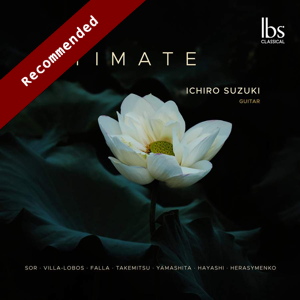
Intimate
Ichiro Suzuki (guitar)
rec. 2021, Agustinos Church, Granada, Spain
IBS Classical IBS42023 [51]
The items on this programme were not chosen to demonstrate showy technique or dazzling virtuosity; they were chosen to highlight probably the greatest virtue of the guitar: its ability to sound intimate and romantic. Ironically, it is this very virtue which for so long inhibited the guitar from becoming an accepted concert instrument, and finding its rightful place in the concert hall.
The current iteration in which we have come to recognise as the guitar, is only a couple of centuries old. These early six-single-stringed instruments lacked both volume and sustain and were more suited to small venues such as the salon. The preference by most early virtuosi to play without fingernails only exacerbated the challenge. The penchant of the great Spanish virtuoso Francesco Tárrega (1852-1909) was for the salon, in preference to larger recital venues; his disciples were of similar disposition. Even the innovations in guitar construction of luthier Antonio Torres (1817-1892), and the related increase in volume and tonal qualities, did not motivate Tárrega to expand his recital horizons to include large venues. While he may have played with thin, fragile fingernails during the earlier part of his career, during the latter part he cut them, and pursued a fingertip-only approach, right up until his death.
It took the visionary Andrés Segovia, and contributions of such luthiers as Ignacio Fleta and José Ramírez III to have the guitar heard in the large concert venues of the world. Today, further innovations in guitar construction,-along with electronic amplification, ensures the longevity of the guitar in the concert hall. However, some claim that these advances in volume enhancement are made at the expense of sound quality.
In relation to the aforesaid, the liner notes comment as follows:This CD has no other ambition than to make us enjoy the music, the silky beauty of the timbre of a universal instrument.
Born in 1948, Ichiro Suzuki has had a long association with the guitar; he began lessons on the instrument at the age of six. Andrés Segovia was one of his most outstanding teachers. For several years Suzuki was the director of the Barcelona International Guitar Festival. He combined this task with concert tours, and the recording of numerous albums in Europe and Japan. In recognition of his contributions, King Juan Carlos I awarded him the Grand Order of Isabello the Catholic (1989).
The programme on this CD covers the early epoch of the guitar (Narvaez) and works by the early virtuosi Sor and Carcassi. In addition, there are more recent compositions by both guitarists and those who did not play the instrument, especially from the pens of Asian composers. Students of the guitar will immediately recognize the first item from the programme which complements the title of the disc. This melody, by R. Sainz de la Maza, is based on the very famous study in B minor of Fernando Sor, number five from the Segovia edition.
This is a most entertaining programme and succeeds admirably in emulating the title of the disc. The playing is excellent, rather sure-footed and ‘old world’ in its charm. Given that Segovia’s playing, along with that of many of his disciples, has also been described in similar terms, this may be accepted as an accolade. It also comes as no surprise, given Suzuki’s tutelage.
Suzuki’s approach to the execution of this music is significantly embellished by the use of a quite magnificent traditional guitar, made by Spanish luthier Paco Santiago Marin. While an individual player’s technique adds much to the final sound, the quality of this instrument is eminently conspicuous.
For all the reasons expressed, this is a well-recommended recording, especially for those who appreciate the intimate and romantic qualities of the classical guitar
Zane Turner
Help us financially by purchasing from



Contents
R. Sainz de la Maza (1896-1981).
Melody based on a study in B minor by F. Sor
Fernando Sor (1778-1839)
Vals in E Major op. 32-2
Luis De Narvaez (1526-1549)
Cancion del Emperador
Matteo Carcassi (1796-1853)
Larghetto
Yousuke Yamashita (b. 1942)
Dear M.
Yoru Takemitsu (1930-1996)
The Last Waltz
Hikaru Hayashi (1931-2012)
Hamon
Minoru Miki (1930-2011)
Mebae
Manuel de Falla (1876-1946)
Homenaje
Heitor Villa-Lobos (1887- 1959)
Prelude No 4
Prelude No 3
Oxsana Herasymenko
Waltz of Sakura Flowers.


















